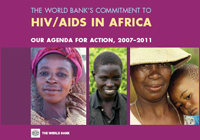 The new publication, The World Bank’s
The new publication, The World Bank’s
commitment to HIV/AIDS in Africa: Our
agenda for action, 2007–2011, reports
that AIDS remains the leading cause of
premature death and is a major threat to
development in Africa.In a new report launched 14 May 2008, the World Bank reaffirms its commitment to a long-term engagement to the AIDS response in Africa.
The new publication, The World Bank’s commitment to HIV/AIDS in Africa: Our agenda for action, 2007–2011, reports that AIDS remains the leading cause of premature death and is a major threat to development in Africa. It also states that the disease has disproportionately hit women and young girls, who need the legal, social, and economic power to protect themselves, access treatment and care, reverse infection, and stem stigmatization.
Agenda for Action is a road map for the next five years to guide the Bank’s staff. It underscores lessons learned to date and identifies actions the World Bank will need to take to ensure it can respond to the demands of member countries and other partners for financial, technical, analytical, and collaborative support
The Bank says it is moving away from its initial ‘emergency response’ role as the world’s principal financier of HIV programmes, towards a new mission with four new strategic objectives. These include: at global level, advising countries on how best to manage the complexity of the international financing they receive; and at local level, helping countries to accelerate implementation and take a long-term sustainable development response to HIV; strengthening the monitoring and evaluation capacity of countries to track the efficiency, effectiveness, and transparency of their AIDS response; and building up stronger health and financial systems.
The World Bank was one of the first organizations to respond to AIDS worldwide. Since 2000, it has provided more than $1.5 billion to more than 30 countries in Sub-Saharan Africa to respond to the epidemic. As one of the ten cosponsors of the Joint United Nations Programme on HIV/AIDS (UNAIDS), it is the lead organization in the areas of strategic planning, governance and financial management.




